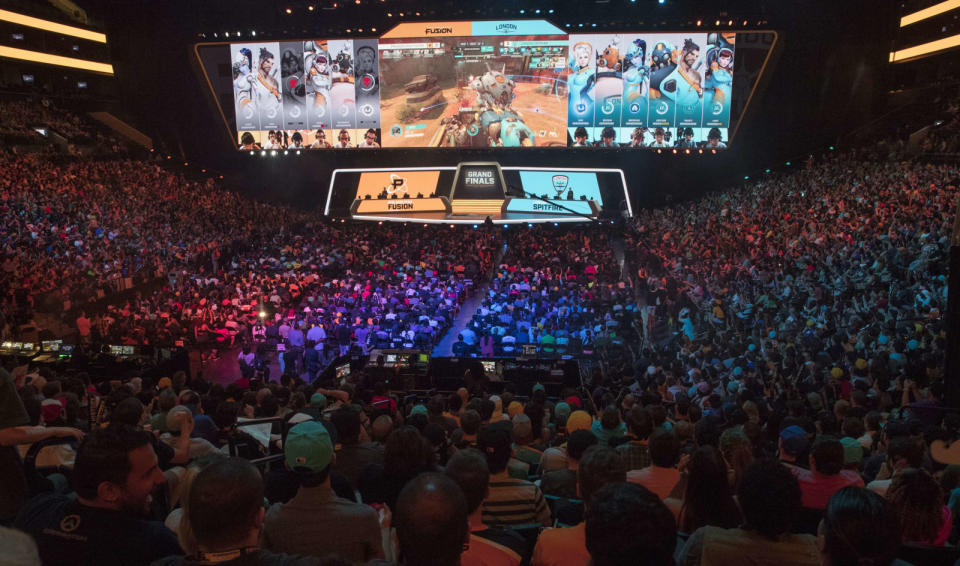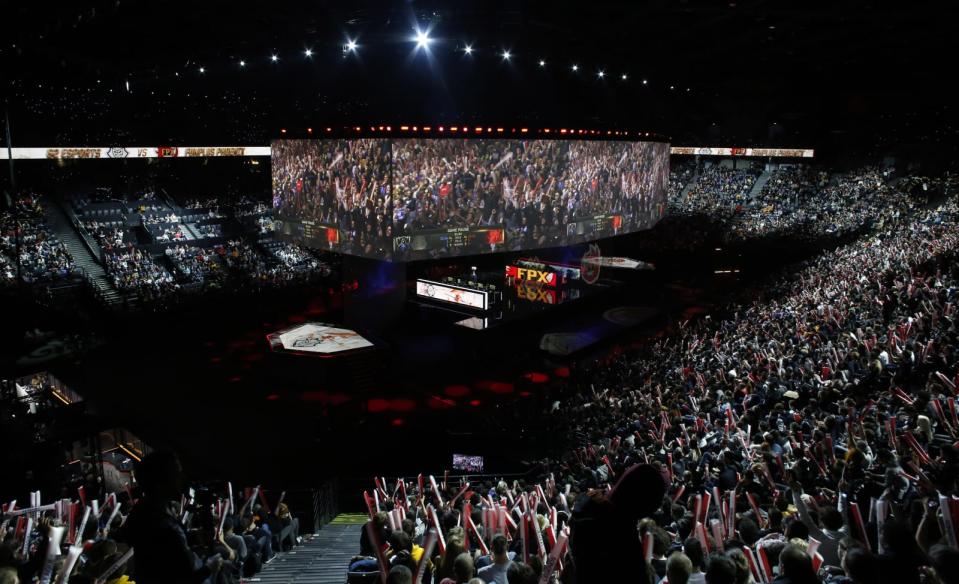Social distancing is pushing esports into the mainstream
The trick is turning this temporary boom into long-term growth.
Industries around the globe have ground to a halt amid the coronavirus pandemic. Bars, restaurants, stadiums and factories have shuttered, and entire countries are on lockdown as citizens are ordered to stay home for weeks at a time in an attempt to control the disease's spread.
With the streets empty, people are turning to their screens more than ever before. Viewership of streaming services like Netflix, YouTube, Twitch, Mixer and Hulu has risen weekly since shelter-in-place orders began rolling out, and people are on the hunt for new forms of entertainment, ideally with a social twist. Something with a chat room, or dozens of forum posts to read through, or an active Twitter and Instagram presence. Something with stats and high stakes. Something live.
Enter: Esports. As economic activity spirals downward around the world, the esports industry has been spun into overdrive. Leagues are ditching plans for in-person tournaments and pivoting to online-only matches, where they're finding a hungry audience.

Chris Greeley is the commissioner of the League of Legends North America League Championship Series, one of the most prominent esports tournaments around. March marks the middle of the LCS spring playoffs, which would normally see teams compete in-person, with live spectators, at Riot Games' venues. The Spring Finals were scheduled to be held in Dallas, Texas, at The Star, a 12,000-seat arena normally used as the Dallas Cowboys' practice facility.
"We're not sure how long LCS will be online-only -- when it's safe and appropriate to do so, LCS will return to a live-event competition because it's an important, entertaining, beloved part of the league and esports in general," Greeley told Engadget. "That being said, we're already in a better position for when live events return because of the capabilities we're building now. Two or three weeks ago, taking LCS online-only was unthinkable, but circumstances changed and we reconsidered options that had been off the table."
In order to stay relevant amid the coronavirus pandemic, every esports league has accelerated its ability to host online-only matches. These are goals that most leagues were already kicking around, with plans to implement new streaming tools, revenue sources and online infrastructure over the coming years. Instead, organizations including the LCS, Overwatch League and ESL Pro League had just weeks -- days, even -- to put rudimentary streaming-only structures in place, in an attempt to save an entire year's worth of work.
For the most part, they've succeeded. The OWL held its first weekend of online-only games on March 28th and 29th, and just days after, Blizzard Entertainment announced it would finish out the regular season this way. The LCS briefly suspended play on March 13th as Greeley and his team rushed to find a solution that would keep the league alive; four days later, they rolled out an online-only tournament schedule and matches have been running since then.
Viewership on streaming platforms is up amid global shelter-in-place orders, though most esports organizations aren't revealing specific figures just yet.
"It's too early to share exact numbers, but we've been pleased with the level of engagement and feedback we've gotten from our community," Greeley said.
And then there are the advertisers. With traditional sports games and annual festivals canceled for now, major brands are taking stock of the current ecosystem and inking deals in spaces they've previously ignored. Esports are an obvious entry point.

Take NASCAR for example. When in-person races were canceled this year, NASCAR and Fox Sports announced the first-ever eNASCAR iRacing Pro Invitational Series, a simulation-style competition featuring stars like Dale Earnhardt Jr., Bobby Labonte, Kyle Busch and Denny Hamlin racing in digital vehicles. It was the first time many NASCAR fans -- and drivers -- were exposed to the magic of professional gaming.
The inaugural eNASCAR race aired on March 22nd and it was the highest-rated televised esports program to date, drawing in 903,000 viewers. It was also the most-watched sports broadcast that Sunday, and the most-watched program on its host channel, FS1, since most sports events were canceled on March 12th. The following race on March 30th clocked 1.33 million viewers, breaking the previous Sunday's record.
Torque Esports is running The Race All-Stars Esports Battle, an online event serving Formula 1, IndyCar, Formula E, NASCAR and other audiences in the wake of mass event cancelations. This event has already attracted new advertising partners including its first corporate sponsor, Jones Soda.
"We're in discussions with many brands at the moment who are looking at esports for the first time," Torque Esports CEO Darren Cox said, noting this is Jones Soda's first foray into the industry. "Our goal, and this goes for streaming numbers and fan interest as well, is that the current situation doesn't become just a blip on the radar. We want to use this as a foundation to continue to grow the sport. Many brands remain in the discovery and education process at the moment, but they are liking what they see."
I joined the world of Esports today. Thank you @wearetherace for organising the #LegendsTrophy & giving a bunch of us old guys a chance to hang out & race together again.
I was delighted to get the win, thanks @BaseSimulators ,well done on the 1-2 finish with @DarrenTurner007 👊🏼 pic.twitter.com/ojuads0Xra— Dario Franchitti (@dariofranchitti) March 28, 2020
This interest isn't limited to the racing genre. Vice President of Overwatch Esports at Blizzard Entertainment Jon Spector said, "We are seeing an increased interest in gaming, streaming and esports overall," while LCS head Greeley said, "We're seeing excitement in partnership discussions."
Greeley noted that in 2019, Nielsen ranked the LCS as the third-most popular professional sports league in the US among 18- to 34-year-olds. This is a coveted market for advertisers, and a sign that esports were already on the radar of major sponsors. The coronavirus pandemic has only accelerated their involvement.
"We see this activity more as a continuation of sponsorship trends than a big change, since the esports ecosystem and leagues like LCS have been gaining momentum for some time now in global media," Greeley said. "Sponsors are drawn to the size and passion of the esports community, and we believe that's only going to continue growing from here."

Torque Esports' analytics group, Stream Hatchet, says esports streaming viewership has grown more than 17 percent from January to March this year, with 1.75 billion minutes of content watched around the world in March alone. A 12-hour Stream Aid Charity Marathon on Twitch last Saturday raised $2.8 million for the World Health Organization's COVID-19 Solidarity Response Fund.
"We're introducing esports to a much wider audience, particularly in the motorsports genre," Cox said. "The 'stay at home economy' is something that is expanding rapidly and our live-streaming data analytics team at Stream Hatchet is certainly seeing dramatic increases in all platforms at the moment."
Of course, the global pandemic has disrupted the esports world, too. Established leagues like the LCS and OWL have the resources to quickly pivot and implement online-only tournaments, and sponsors are already knocking. However, newer leagues might find it harder to catch their footing. For instance, the Apex Legends pro scene kicked off this year and was already struggling with server issues, a lack of advertising and poor management structures before the outbreak began. Organizers announced yesterday they would move the remainder of the Apex Legends Global Series online, with the finals airing on Twitch and YouTube on April 6th. It's a rough first year for any league.
Even established organizations are feeling the pressure: Chaos Esports Club let go its entire Dota 2 squad following the suspension of the Dota Pro Circuit this year.
"This is not a decision we made lightly, but during these uncertain times and with the DPC circuit suspended it is impossible for us to justify the cost of a Dota 2 team at this time," Chaos Esports Club CEO Greg Laird said at the time. "The world is an unprecedented situation and it is necessary for us to focus our efforts into a few key current and upcoming projects for the long-term success of the organization."
Today we unfortunately have to announce the release of our Dota 2 Roster.
If you are an organization or sponsor looking to work with the team please contact their manager, @KBBQDotA , directly via reachjackchen@gmail.com
Read More: https://t.co/XEcRsvMP54 pic.twitter.com/mCDADnvAXx— Chaos EC☣️ (@ChaosEC) March 25, 2020
Compared with many other industries, esports have experienced low job loss during the global pandemic, largely because leagues are able to transition online instead of shutting down altogether. Unemployment rates in the US are expected to hit their highest point since World War II, with conservative estimates projecting 20 million Americans will lose their jobs in the next few weeks.
Esports are well-positioned to serve an audience that's trapped at home, and organizers are doing everything they can to capitalize on this strange new market. The trick, they say, is making all of this progress stick even after the pandemic has ended.
"We're very interested in using this as the foundation for long-term growth," Cox said. "Esports as a whole has been growing dramatically in recent years and now we're in a massive spike. Once traditional sport returns we're obviously going to see a levelling off. But in five years' time we want to look back on today as not just 'the COVID-19 esports thing,' but as a tipping point for when esports took its first steps into the mainstream and cemented its place alongside other professional sports."



